2014 Farmers Weekly Diversification finalists revealed
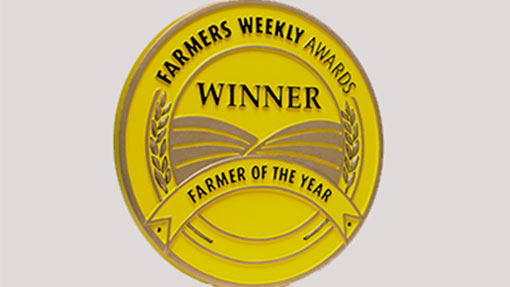
This year’s Diversification finalists show the different directions new on-farm businesses can take and the broad benefits they can bring. That can mean smart succession planning, creating jobs for the local community or promoting farming to a wider audience.
All the businesses expanded from an authentic farming core to secure a sustainable future for their families.
David and Diana Harper
Top Barn Farm, Worcestershire
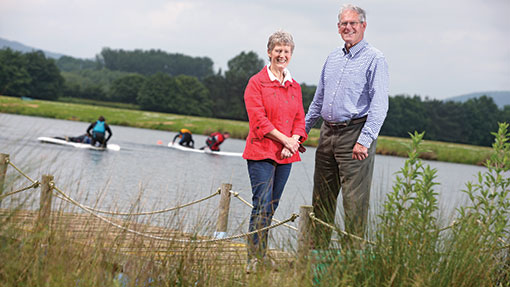
Plenty of farm diversifications are family affairs. But for David and Diana Harper and their three sons, family is the core of the business structure and has helped them build a broad range of on-farm enterprises.
David and Diana bought Top Barn Farm in 1967 and over the years have grown potatoes, fruit and vegetables and run cattle, sheep and turkeys on their 320ha holding.
In 1990 they started converting old agricultural buildings into business lets and in 2000 they opened a farm shop.
Then, in 2003, as an early succession plan, David and Diana sold most of the farm to their three sons, who have since built up individual businesses – but all under the Top Barn banner.
“Inheritance is such a big thing in farming,” says David. “A lot of people are fighting over it and they do not need to. We are all individual, but there is strength in working together.”
Farm facts
- Farm shop and farm park, business lets, activity centre, pool and river fishing, caravan club site
- 320ha mixed farm with 50-cow suckler herd and hand-harvested vegetables
- Separately owned businesses
- Combined turnover of more than £5m
Diversity
Son John and his wife Alice run Harper Farming on the majority of the land.
They have a 50-head suckler herd and grow about 60ha of cereals, as well as a variety of hand-harvested vegetables.
About 90 staff work in the on-site packhouse, which also packs vegetables for fresh produce supplier Minor, Weir & Willis.
Son Richard and his wife Nicky bring thousands of people to the farm each year with dog shows and caravan rallies, and they also look after the four fishing pools.
They also run a charcuterie, making salami and chorizo that is sold to farm shops and delicatessens under the Severn Spots brand – named after the Gloucester Old Spot pigs Richard used to rear.
Son Mike and his wife Joanna employ six full-time staff in the Harvest Shop.
They also run a plant centre, maize maze, pick-your-own farm and farm park that gives farm tours on the back of a trailer.
Meanwhile David and Diana have kept control of Top Barn Business Centre, which has 60 tenants on 2ha, ranging from printing firms to equestrian supplies.
In 2007, they also set up an activity centre based around an old windsurfing lake on the farm that attracts up to 12,000 visitors a year.
Strength in numbers
With so much going on, they meet regularly and work closely when needed.
The businesses operate as separate entities, but the Top Barn management board of Mum, Dad and sons meets regularly to discuss anything that crosses over, such as the joint website or access roads.
Diana believes the separation is a big advantage.
“With each of them having their own business, they can develop it as they want to,” says Diana.
“If it was under one big structure there would be a rigidity to it. There is nothing quite as strong as a family bond, but communication is vital.”
The farm is a hive of activity, with at least 200 workers on site each day, as well as visitors to the attractions.
There are strong links between the businesses. For example, John’s produce and Richard’s charcuterie can be found in Mike’s Harvest Shop, and tenants in the business centre can pick up hot dishes from the bakery at lunchtime.
Responsibility
David and Diana are also heavily involved in care farming projects at Top Barn, helping disadvantaged people through growing crops and rearing animals.
In 1998 they set up a special-needs centre, which was followed by projects for those with dependency problems, excluded school pupils and those on probation schemes.
In time they hope to take young people to a training centre on their 40ha French farm in the Vendée and to Africa, where they have close ties to community farming initiatives.
“We saw young people quite aimless when they finished school and we put together a plan to take people away, giving them an experience away from home,” David says.
“It is something we feel a responsibility to do, rather than it being for profit.”
Helen and David Harrison
Harrisons of Greyabbey, Co Down
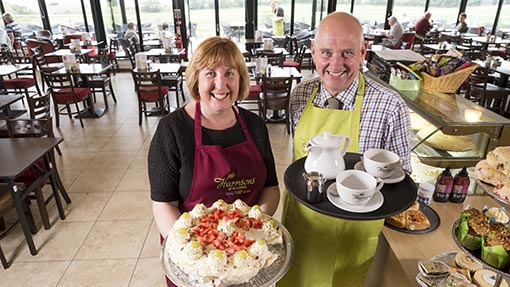
Few diversified farmers can be as dedicated to their customers as Helen and David Harrison.
Last year, 100,000 people visited the restaurant, farm shop and nursery at Harrisons of Greyabbey, which enjoys breathtaking views across Strangford Lough.
When Farmers Weekly visited they had just enjoyed their busiest ever weekend, with more than 1,000 people through their doors.
Helen and David spend as much time on the shop floor as possible, are on first name terms with many customers and keep an eye on the little details, such as sweeping gravel off the drive the morning before big groups of cyclists arrive.
David calls it the “boomerang effect”. He says: “We want customers to come here and think, ‘That was great, I must come back again.’
“People have to travel down the peninsula to get here, so we have to be special.”
History
The Harrisons used to keep dairy cows, pigs and sheep, but in the early 1990s they began growing potatoes and vegetables to sell to nearby shops.
Next David started filling hanging baskets and opened an on-farm nursery. But with their three sons returning to live at home, they wanted to expand their offering.
After two government-backed training courses, research trips to several diversifications in Yorkshire and a rural development grant, they settled on a farm shop and restaurant and finally opened in March 2012.
“Anything we want to go into becomes our hobby,” Helen says. “We go to restaurants, cafés and shops – it’s our life and passion.”
The restaurant serves up generous portions of traditional dishes, the shop stocks local food and high-quality gifts and cards, and David’s home-grown plants fill the nursery.
Farm facts
- 130-cover restaurant with panoramic views on terrace
- Nursery and 84sq m farm shop
- 50 staff – all living within seven miles
- 35ha arable farm, back into potatoes next year
- Diversification turnover of £1.2m
Local focus
The Harrisons employ 50 staff, all living within a seven-mile radius, making them one of the biggest employers on the peninsula.
The most experienced staff are designated leaders who wear different-coloured aprons, but all employees are encouraged to suggest ideas about taking the business forward.
David and Helen also have strong business connections within the Ards Peninsula community.
Helen spent 20 years working for the National Trust at 18th-century Mount Stewart House and both attractions send coaches to each other.
Shopkeepers in nearby Greyabbey and Newtonards appreciate the extra footfall, as coachloads arrive at the Harrisons’ farm from several hours away.
David and Helen say it is “very satisfying” to have the family working together in the diversification, with their three sons playing different roles.
Robert runs a farm contracting business, Andrew’s varied responsibilities include looking after the farm shop and William may come back from a job in banking to manage the finances.
Neighbours have helped farm the Harrisons’ land while they focused on the diversification, but the family plans to do more themselves next year, including planting 0.4ha of Maris Piper potatoes for the restaurant.
“I would love to be farming, but we have to be here in the restaurant and shop,” David says. “If we were not here, it would not run as well.”
Fast growth
The business has grown rapidly –David and Helen’s five-year turnover target was hit in less than two years.
But they have had to take some bold decisions, such as closing the farm shop’s butchery last September as it didn’t match their customer base, and sticking to their religious beliefs and staying closed on Sundays.
The plans for the coming years are about fine-tuning.
David and Helen are considering building a meeting or function room, adding extra space to the busy kitchen and expanding the area dedicated to the nursery.
Converting the farmhouse into a bed and breakfast and creating a kitchen garden linked to the restaurant are other possible projects.
But the ultimate aim is for the three sons to be running the business themselves.
“The farm and nursery would have kept us going, but there would have been nothing left here for the boys,” David says. “The diversification is for them – we are going to have jobs for the boys.”
David Horler
Tractorland, Somerset
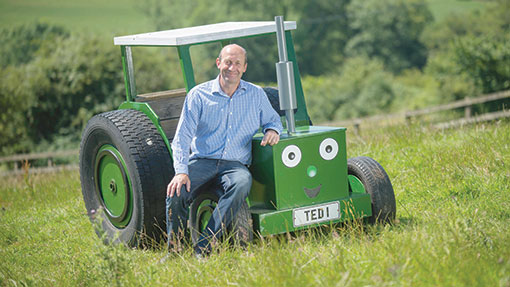
It started with the kids. Fourteen years ago, Somerset farmer David Horler and his friend Ally Heard saw their preschool children were fascinated with the farm machinery in the fields.
Neither knew a thing about filmmaking, but they enlisted a couple of Bath University students to help make a 30-minute video explaining the process of breadmaking – from seed to bakery shelf.
Thirteen years, 17 DVDs and 11 books later, their Tractor Ted brand is stocked in 600 country shops in the UK and Ireland.
In 2013, they sold 90,000 DVDs, 40,000 books and a range of other merchandise.
The smiling green tractor is also the face of play farms in Wiltshire and Perthshire that attract 250,000 visitors a year, and an annual farm show.
“It is about trying to put something back into farming,” David says. “Little children love Tractor Ted and learn from it, and their parents and teachers approve.”
Strong brand
At the core of the business is a tightly controlled brand.
There are now 65 Tractor Ted lines, including a clothing range, but every product has to hit the benchmark of John Lewis quality.
The products aim to entertain and teach children aged two to six, and the business has gathered endorsements from celebrities such as Ben Fogle and Clare Balding.
Television companies have encouraged them to animate the videos, but David decided to keep live action as it better showed the realities of farm life.
The Tractor Ted team works in an old threshing barn on David’s Somerset farm, with nine sales agents around the country.
David runs Tractorland with his two business partners, creative director Ally and marketing director Alexandra Beeley.
The eight-strong staff get to see all the sales figures at the end of each week, set against targets tweaked for seasonal differences.
David says this “really cheers everyone up” and gets them rushing to get orders on the books late on a Friday.
In 2012 the business invested heavily in IT for online sales and stock management, which David admits is a challenge, as some products have lead times of up to 15 weeks.
Online trade is progressing, with 10% of merchandise sales now through the website and a highly rated Tractor Ted smartphone app now available.
Farm facts
Fit with farm
The agricultural side of the business has not been left behind. David’s nephew Tom runs the 200ha organic farm on a day-to-day basis, growing wheat, barley and red clover and running a 50-cow suckler herd.
It regularly returns profits of more than £100,000/year.
They work closely with their neighbours. For example, local machinery dealers bring combines and tractors to a farm show in exchange for some free family passes, and a nearby dairy farmer takes the red clover for silage.
The diversification and farm businesses fit closely. David’s desk looks on to the farmyard, he can walk the crops on weekends, and the office is housed in one of the farm buildings converted into workshops in 1990 as an original diversification.
And it was while filming a Tractor Ted video for the Soil Association that David was so impressed by the crop quality on the organic holdings he visited that he decided to convert his own farm.
Future
Though Tractor Ted is growing strongly, David and Tom still want to build up the farm. They hope to take the suckler herd to at least 100 in the next few years.
And there is a clear strategy for the future of the diversified business, which has consistently seen 15-20% revenue growth during the past 10 years.
They are looking at opening a third play farm in Hampshire, and exploring the idea of Tractor Ted-branded play barns.
“The vision for Ted is to get into more urban homes, to get the message to those children about farming,” David says.
“It is all about where the food comes from and we want more people to connect with farming.”
Sponsor’s message
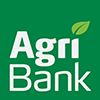 “Diversification can keep farm businesses viable in the long run. The three finalists show an impressive set of ideas that bring financial and social benefits to the wider community.”
“Diversification can keep farm businesses viable in the long run. The three finalists show an impressive set of ideas that bring financial and social benefits to the wider community.”
Matthew Smart
Find out more about the 2014 Farmers Weekly Awards
